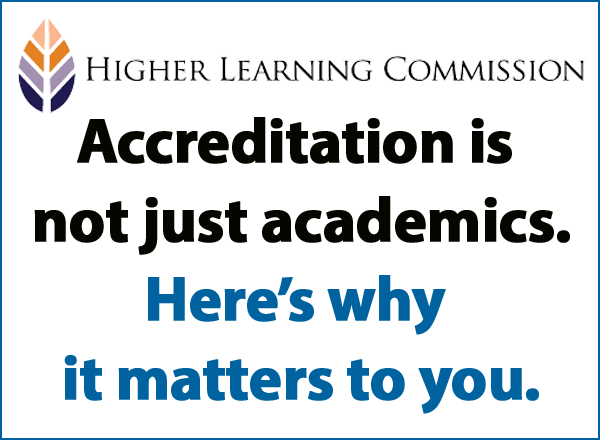Accrediting Henry Ford College
Gallery

This past September, the Higher Learning Commission (HLC) visited Henry Ford College to reinstate its accreditation. To the everyday student, this might not seem like a big deal, but if you keep up with President Kavalhuna’s emails, you’d know that this process is imperative to HFC’s development.
Put simply, accreditation provides students the opportunity to seek federal financial aid and the ability to transfer to other institutions. “In order for a student to be able to use financial aid dollars at a school, that school has to be accredited,” said Lori Gonko, the Vice President of Strategy and Human Resources who serves as the Accreditation Liaison Officer, or the “go-between” from HFC to the HLC. While the status is optional, it inherently demonstrates a quality education and, therefore, a viable diploma. According to Gonko, “over 50 percent of our students use financial aid dollars to come to Henry Ford, so if students couldn’t pay for their education with financial aid here, we’d lose more than 50 percent of our student population.” Applications from non-accredited institutions are usually denied, and, as an institution with mostly two-year organizations, this credential is crucial.
The United States is divided into several regions and each is assigned an independent accreditation agency. The HLC dominates the Midwest, enlisting the proper credentials to any higher-learning institute wishing to obtain them. Accrediting bodies serve as monitors for the U.S. Department of Education. The HLC, for instance, creates a series of standards that all colleges have to meet, from community engagement to student success to finances.
The accreditation process requires a lengthy, in-depth assessment that’s repeated every few years to ensure that all standards are being met. HFC, for example, is on the 10-year pathway, in which HLC representatives are sent during the sixth and tenth years. The same group never visits twice, and the members themselves range in experience, age, and educational occupation. “The Higher Learning Commission maintains this body of people who are faculty, presidents, different people who work at colleges and volunteer to be reviewers, so we’re being reviewed by people that are in positions like ours,” Gonko said.
Prior to the evaluation, HFC prepares by forming committees, educating staff, and writing an assurance argument. While formal assessment only occurs twice in ten years, the college initiates the process up to two years in advance. “It’s a constant engagement,” Gonko said. As Accreditation Liaison Officer, Gonko explains the procedure as received by the HLC to the entire college. First, a general committee is formed, encompassing faculty from all sectors of HFC. After several fundamental meetings, the committee is then broken down into various sub-committee based on the five criteria: Mission, Integrity, Teaching and Learning (divided into two groups: Quality, Resources, and Support and Evaluation and Improvement), and Resources, Planning, and Institutional Effectiveness.
Perhaps the most important piece in HLC’s assessment is the assurance argument, a compilation of evidence that demonstrates the college’s adherence to the criteria, including a list of changes made since the last visit. The last two have been written by Betsy Cohn, a full-time English faculty member, with the help of other staff within her committee. The report was approximately 140 pages in length and included dozens of articles that show valid modifications. “There were pieces in there like floor plans because we wanted to show that we had adequate learning facilities,” said Dr. Jennifer Ernst, Dean of HFC’s School of Liberal Arts.
The visit took place in mid-November over the course of several days. The HLC sat in classes, attended meetings, held criteria-related informational sessions, and hosted a luncheon for engaged students looking to inquire about the college. Any activity proposed by the Higher Learning Commission emphasized conversation and collaboration. The student luncheon, for instance, consisted of an ongoing conversation among students that typically involved an HLC representative. Students were free to speak on their personal experiences at HFC, good or bad, in private exchanges as opposed to a Q&A format within a larger group. HLC’s main role was to observe, seeing the true structure of the college without interruption. “[The process] got at the overall collaboration across the institution,” said Cohn.
Following the visit, the Higher Learning Commission reports back to HFC with feedback, sharing the good and to-be-improved aspects of their visit. Though HFC has never been denied accreditation, there’s always room for reform. In their last visit, the HLC noted a lack of awareness regarding the Institutional Learning Outcomes (ILO) amongst the college community. Ruth Haller, co-chair for the Committee for the Assessment of Student Learning (CASL), worked to spread awareness about said ILOs. “That is why you’ve seen posters all over campus which list and define the different ILOs and explain why they are relevant to students,” she said.
HFC received overwhelmingly positive feedback during and after HLC’s visit. The college quickly received accreditation status, making it time to prepare for the next round. Now, those closest to the procedure are working to input all physical data into an electronic database, enabling easy access to anyone interested. For more information on the accreditation process at HFC, https://www.hfcc.edu/news/2019/why-does-our-2019-accreditation-matter
